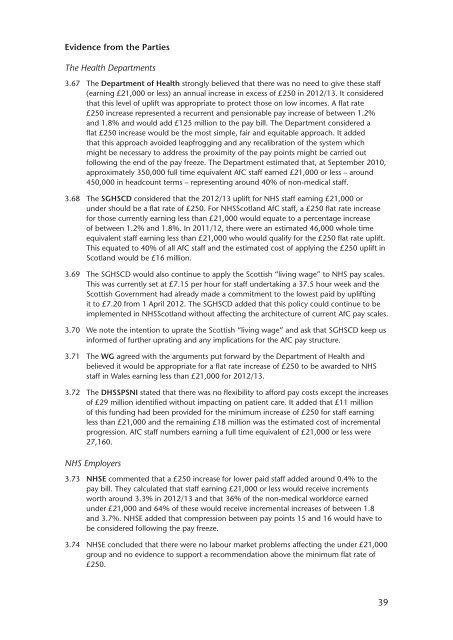NHS pay review body: twenty-sixth report 2012 - Official Documents
NHS pay review body: twenty-sixth report 2012 - Official Documents
NHS pay review body: twenty-sixth report 2012 - Official Documents
Create successful ePaper yourself
Turn your PDF publications into a flip-book with our unique Google optimized e-Paper software.
Evidence from the Parties<br />
The Health Departments<br />
3.67 The Department of Health strongly believed that there was no need to give these staff<br />
(earning £21,000 or less) an annual increase in excess of £250 in <strong>2012</strong>/13. It considered<br />
that this level of uplift was appropriate to protect those on low incomes. A flat rate<br />
£250 increase represented a recurrent and pensionable <strong>pay</strong> increase of between 1.2%<br />
and 1.8% and would add £125 million to the <strong>pay</strong> bill. The Department considered a<br />
flat £250 increase would be the most simple, fair and equitable approach. It added<br />
that this approach avoided leapfrogging and any recalibration of the system which<br />
might be necessary to address the proximity of the <strong>pay</strong> points might be carried out<br />
following the end of the <strong>pay</strong> freeze. The Department estimated that, at September 2010,<br />
approximately 350,000 full time equivalent AfC staff earned £21,000 or less – around<br />
450,000 in headcount terms – representing around 40% of non-medical staff.<br />
3.68 The SGHSCD considered that the <strong>2012</strong>/13 uplift for <strong>NHS</strong> staff earning £21,000 or<br />
under should be a flat rate of £250. For <strong>NHS</strong>Scotland AfC staff, a £250 flat rate increase<br />
for those currently earning less than £21,000 would equate to a percentage increase<br />
of between 1.2% and 1.8%. In 2011/12, there were an estimated 46,000 whole time<br />
equivalent staff earning less than £21,000 who would qualify for the £250 flat rate uplift.<br />
This equated to 40% of all AfC staff and the estimated cost of applying the £250 uplift in<br />
Scotland would be £16 million.<br />
3.69 The SGHSCD would also continue to apply the Scottish “living wage” to <strong>NHS</strong> <strong>pay</strong> scales.<br />
This was currently set at £7.15 per hour for staff undertaking a 37.5 hour week and the<br />
Scottish Government had already made a commitment to the lowest paid by uplifting<br />
it to £7.20 from 1 April <strong>2012</strong>. The SGHSCD added that this policy could continue to be<br />
implemented in <strong>NHS</strong>Scotland without affecting the architecture of current AfC <strong>pay</strong> scales.<br />
3.70<br />
We note the intention to uprate the Scottish “living wage” and ask that SGHSCD keep us<br />
informed of further uprating and any implications for the AfC <strong>pay</strong> structure.<br />
3.71 The WG agreed with the arguments put forward by the Department of Health and<br />
believed it would be appropriate for a flat rate increase of £250 to be awarded to <strong>NHS</strong><br />
staff in Wales earning less than £21,000 for <strong>2012</strong>/13.<br />
3.72 The DHSSPSNI stated that there was no flexibility to afford <strong>pay</strong> costs except the increases<br />
of £29 million identified without impacting on patient care. It added that £11 million<br />
of this funding had been provided for the minimum increase of £250 for staff earning<br />
less than £21,000 and the remaining £18 million was the estimated cost of incremental<br />
progression. AfC staff numbers earning a full time equivalent of £21,000 or less were<br />
27,160.<br />
<strong>NHS</strong> Employers<br />
3.73 <strong>NHS</strong>E commented that a £250 increase for lower paid staff added around 0.4% to the<br />
<strong>pay</strong> bill. They calculated that staff earning £21,000 or less would receive increments<br />
worth around 3.3% in <strong>2012</strong>/13 and that 36% of the non-medical workforce earned<br />
under £21,000 and 64% of these would receive incremental increases of between 1.8<br />
and 3.7%. <strong>NHS</strong>E added that compression between <strong>pay</strong> points 15 and 16 would have to<br />
be considered following the <strong>pay</strong> freeze.<br />
3.74 <strong>NHS</strong>E concluded that there were no labour market problems affecting the under £21,000<br />
group and no evidence to support a recommendation above the minimum flat rate of<br />
£250.<br />
39
















